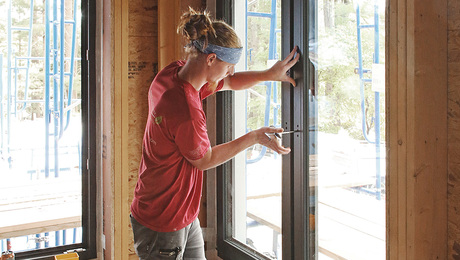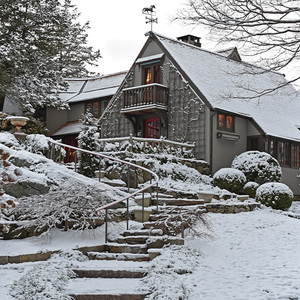*
It may actually be stainless steel, in which case it would be ok. Look for some printed I.D. on the outside which would say something like 304, 306, 317.
Discussion Forum
Discussion Forum
Up Next
Video Shorts
Featured Story

This time-tested installation method for flangeless windows ensures smooth operation and provides air, water, and vapor control.
Featured Video
Video: Build a Fireplace, Brick by BrickHighlights
"I have learned so much thanks to the searchable articles on the FHB website. I can confidently say that I expect to be a life-long subscriber." - M.K.














Replies
*
Just realized that my dryer is hooked up with a 3/8" Aluminum tube, not copper. Since I've never seen this before I wonder how safe or appropriate this is (maybe an old "great idea", like aluminum house wiring or lead paint, that we no longer like). Looks like it was installed in the late '70s or early '80s.
The stuff is covered with a plastic sleeve (I guess for protection from puncture / damage).
Any thoughts?
*never heard of aluminum tubing being used. Copper is definitely not allowed, as the sulfur sometimes present in natural gas can corrode through the copper. I'd suspect the same risk holds with aluminum.I've only seen flexible steel tubing used.
*Do you have a reference as to the copper tubing not being allowed. It is allowed here, and I have never had any problems. I have heard that it is not allowed some places for the reasons you stated but have never been able to find any reliable information on it. Would like to know where you got your info.
*Contact a natural gas assoc. or a good plumber. Seems to me there was a warning about a certain type of flex. supply for stoves/dryers. Sorry this old mind can't remember. Best of luck
*When in doubt....change it out.near the stream, thinking cheap peace of mind,aj
*It may actually be stainless steel, in which case it would be ok. Look for some printed I.D. on the outside which would say something like 304, 306, 317.
*copper and black iron is the norm here, they also use a lot of the plastic gas line for burial..but the aluminum doesn't surprise me, just unusual, a lot of the internal piping in the equipment is aluminum...here's CABO (1 & 2 Family).. black steel, Galv. Steel, Corrugated SS, Soft copper , K or L, copper or brass pipe, and plastic pipe for burial only...some restrictions as to marking and labeling....
*Mike,Been doing some after life planning -- forced upon me by all of the tele-marketers selling plots -- and I wonder why I'd want a burial gas line, much less plastic. Should be hot enough where I'm going, I'd figger. Just looking at all the angles.
*Barry , see the joke in the Woodshed about hell (Joke..."not really a joke" ... by CLS ) freezing over... worth the trip...the burial gas line is for the "eternal flame".. geeesh.. i gotta tech u everthin....nite, Barry
*Thanks for all the info.It is aluminum (not stainless), and since copper has some concern for gas, as noted (I have seen it done before around Mighigan, though, wonder if there are any local codes against it), I think I'll leave the Aluminum alone.Maybe the concern with Aluminum is how soft it is, since it is used inside appliances often. I will make sure that it does not get pinched, and the plastic coating (real tough stuff, PVC I think) should protect it. It is behind the dryer, so away from most sharp articles (just socks, mostly).I know that the currogated stainless steel is the norm these days, but it has such a thin wall that I still feel like tubing makes me more comfortable.
*charles,there are 100s of hits on copper/ gas corrosion if you do a Google search.just a couple are:http://protection.copper.org/overview.htmlhttp://www.gri.org/cgi-bin/re?url=http%3A//www.gri.org/pub/abstracts/gri93_0122.htmlThe last one, from the Gas Research Institute, says:"Corrosion rate of copper in natural gas environments depends primarily upon the hydrogen sulfide (H2S), oxygen, and water concentrations........corrosion will not occur if corrosive constituent concentrations of gases remain within typical limits. However, corrosion products can form on copper tubing exposed to natural gas with H2S, oxygen, and water concentrations that are within specified limits ..."He's saying corrosion "should not" occur, but "can" occur under "typical" conditions.Maybe it's a regional thing. I don't recall ever seeing copper gas tubing when I poke around in So Calif new construction.
*I just thought someone who would say "copper is definately not allowed." might Know what they were talking about. Maybe its not allowed in California, I dont know, and it sounds like you dont either. I just dont like to see bad information being passed out as fact. I do know that copper is allowed here. and a lot of other places. I have heard rumors of additives in natural gas damaging copper tubing but even after checking most of the sites you listed still have not seen any information that says copper can not or should not be used for gas.
*Charles.. yur right, see number 4.0 above... CABO allows it, and i wud imagine all the other regional codes do too...oh well, i'm still waiting for someone to show me where it says that i can't use aluminum flashings with fiber cement siding products.....
*Mike,Be careful what you wish for...Someone, somewhere, will pop up with a law or rule about why you can't do such and such, even if they have to cobble it up overnight or on a slow day in the city ordinance writing office, such as...City Ordinance 607.9.002 ConstructionRule 607.9.002(a)Flashing, aluminum.Background:Seasonal movement of dissimilar building products in contact with each other will, over a period of time, produce wear or degradation on that product which is less tolerant of abrasion.It has been determined that a cementious product will produce wear in thin aluminum flashing material with the potential to compromise the integrity of that product.Rule:Therefore, to preclude the possibility of failure due to abrasion, aluminum flashing is NOT AUTHORIZED under City Code to be used in conjunction with any cementious siding or roofing products.Signed, your local, I got a job for life, Bureaucrat.
*Ralph... don't ya just wish you cud get one a dem yobs...9-5... 5/7, 4 weeks vacation, and lots of staff to implement your musings.....hmmm
*That is a scarily accurate piece of beaurocratise, particularily since the logic is perfectly good.
*
I remember years ago hearing that a gas appliance
fire was caused by leakage from a copper line that had been physically damaged, and that iron should be used outdoors,for wall penetration and the run to termination for purposes of durability.
Don't think the copper is actually banned by CABO,
but that it was a recommendation from the gas appliance manufacturers. Wish I could remember the source but I'm old and fragile now.